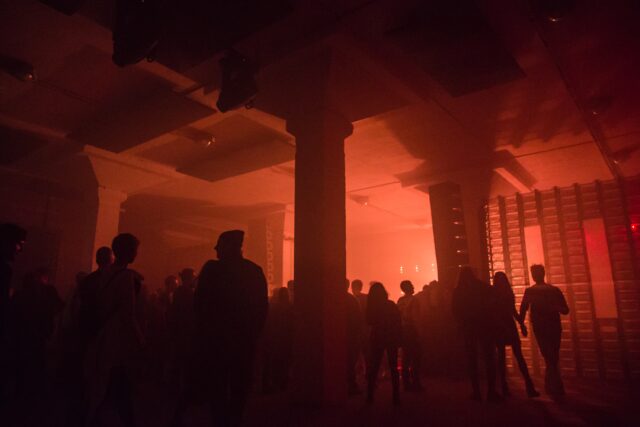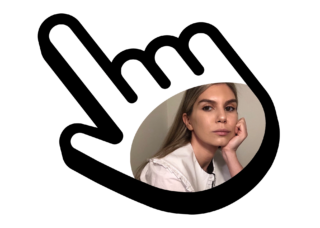Essay Online
Notes From The Underground
Inside the world of underground warehouse raves, forest parties, and Freetekno.
By Zack Graham

A bald giant wearing an earpiece swung the door open. We slipped past him and crossed a large empty room covered in graffiti murals of koi fish and dragons. That was when I became aware of the bass. It leaked out from corners and cracks and crevasses. We paid the $20 cover to a bald woman wearing a spiked choker. She stamped our wrists and led us down a dark hallway to a thick steel door.
This was the first time I had ever been to an underground rave. At five in the morning on a Sunday, a friend and I had tumbled out of a car onto a residential side street in Queens. Multicolored houses, dilapidated driveways, overgrown lawns. My friend had known where to go. She led me to a graffiti-covered warehouse and banged on the door a few times. Birds chirped. A white lady in spandex jogged past. I was positive we were in the wrong place.
Inside, the deafening bass swallowed us. It was like passing through a wormhole into another dimension. I could barely see anything. All I could feel was body heat.
Up until that moment, my only exposure to raves had been through EDM (Electronic Dance Music) events—concerts that charged anywhere from $60 to $150 for the opportunity to see famous DJs at large commercial venues. Those spaces were packed with guys in fur vests strung with lights and girls in gem-studded underwear. The primary drug of consumption was MDMA—more commonly known as Molly—which causes the brain to release unnaturally high levels of serotonin, thereby simulating euphoria, a sensation referred to as “rolling.” Security guards would make a half-assed effort to search entrants upon arrival, despite the fact that it’s largely accepted that the happy-go-lucky music and the expensive light shows are all designed to accentuate rolling’s fake joy. I’d been to bigger festivals as well, like Electric Zoo or Governors Ball, but all of these events were variations on a theme: rich kids drinking, doing drugs, and dancing. When most people think of electronic music, those kinds of gatherings come to mind. They’re glorified frat parties, nothing more. I’d never really enjoyed them.
The party I had just walked into couldn’t have been more different. My eyes took a moment to adjust. Water collected in black puddles on the floor. The walls were coated with wet grime. Half the people were smoking cigarettes, but that couldn’t mask the foul stenches washing over me. The music was the kind of relentless pounding one would hear in an auto body shop, booms and clacks and thraps that lashed at my senses.
The people around me were in the throes of various kinds of drug-induced insanity. A dark-skinned guy wearing what appeared to be traditional native dress and face paint danced in a circle, whooping and shouting. A towering person in high heels vogued, strutting back and forth, dropped into a split, and popped right out of the split back into the strut. One guy—he must have been fifty years old—was so sweaty he could have easily just walked out of the ocean. He ran in place in front of the single fan in the space. Every so often he’d drop to all fours, barking like a dog and swallowing cold air.
A folding table near the back was covered with cans of cheap beer and bottled water. The guy selling them was so fucked up he had to lean on the wall for support, so every drink you got was smeared with mud. When I asked him where the bathroom was, he pointed at a black door that hung off its hinges. Inside, the toilets were clogged with paper towels. When I flushed, piss-water overflowed out of the stall and onto the feet of the cigarette-smoking fiends waiting in line. No one seemed to care.
I was terrified. Who were these people? What was this place? Every time the DJ transitioned from one thrasher to another, the creatures shouted or whistled or hooted. They snorted white, yellow, and pink powders off tiny spoons dangling from chains around their necks. Not only was drug use allowed, it was encouraged. I had no idea how to dance, what to say, or how to act. I had tumbled down a rabbit hole, and I was as confused as I was intimidated. I asked my friend how long the place stayed open.
Until no one’s left, she said.
Later on, I learned that the party had continued until midnight. We had left around noon, after dancing until we were exhausted. Once I recovered from the party, I started researching the origins of EDM. I had to find out if the party I had just been to was some kind of freak anomaly, or part of something bigger.
Raves began back in the 1980s in reaction to the oppressive political forces of the time. They were refuges from capitalism, primarily, but also from racism, homophobia, sexism, and the State—places for the poor, the Black, the queer, and the otherwise oppressed to gather and practice self-expression, creativity, illegality, deviance, and unity. Organizers would occupy abandoned factories and warehouses in cities that had once been industrial hubs. Motown-influenced techno took Detroit. Soul-influenced house conquered Chicago. Variations of the techno and house subgenera flourished in Hamburg and Frankfurt and Manchester. Attendees showed up to escape the persecution, desperation, and existential despair of the Iron Curtain or Lady Thatcher or the Reagan Era.
As raving became popular, nightlife entrepreneurs realized how much money could be made from them. Underground raves became nightclubs became superclubs became massive music festivals. By the late aughts, the industry began to look like the one I’d first encountered: famous DJs performing at expensive, well-produced events for people who had no appreciation for the music or its history. The global EDM industry was valued at roughly $7.2 billion prior to the pandemic, and the vast majority of that revenue came from the kinds of soulless, overblown money grabs I’d been attending on and off since college.
Reading about places like the Music Institute in Detroit, the Music Box in Chicago, and the Ministry of Sound in London made me realize the underground party I’d gone to was a return to the origins of raving: countercultural, subversive, and rebellious. The EDM parties I’d been to were blasphemy, a transmogrification of a sacred ritual. In Queens, I’d stumbled upon the real thing.
When I returned to the party in Queens a month later, I felt less afraid in the darkness and the body heat. I found the filth far less repulsive; on the contrary, it gave the place an authenticity and an edge. Nothing was sanitized or white-washed—we were the grunge, beasts reveling in what made us animals. At one point the DJ cut the music and a demonically low voice crawled out of the speakers.
There is no such thing as paradise
Let me take you
To Hell
Hell
Hell
Hell
Every time the word hell hit, a kick drum shook the room. People shrieked and screamed. My body moved in ways I’d never thought possible. The track unleashed a creature inside me and time disappeared. Night had already fallen when I managed to extricate myself from the warehouse. I was shocked to discover I’d been there for eleven hours.
The more times I went to the party, the more quickly and seamlessly I transitioned into that timeless flow-state. I started wearing scarfs and shawls and cloaks and weird sunglasses. I hooted and purred and hollered when the DJ transitioned. When I went underground, my life above ground became a distant memory. I entered a parallel reality. When I walked through that door, I became someone else. There was no grand design, nothing to be gained, no goal to be accomplished, no honor to achieve. I simply was.
My day job requires international travel, and after I fell into that scene in Queens, I started looking for underground parties during work trips. I’d go to mainstream electronic music venues and ask around about other parties. More often than not people would write me off because I was American. The United States has played a major role in stripping electronic music scenes around the world of anything good, a sad irony, given disadvantaged and marginalized American communities created these scenes in the first place.
London had some good parties. So did Berlin. But in Vienna I fell into an underground scene that far surpassed the rest.
An American friend of mine who lived in Vienna texted me the address one Saturday night during December of 2019. I arrived to find a crowd of dreadlocked kids covered in tattoos smoking on the sidewalk. My friend greeted me and introduced me to someone I’ll refer to from here on out as The Turk to protect his identity.
The Turk was a tall, mangy dude covered in tattoos. This is Freetekno, he said. We come from all parts of Europe, the Middle East, and Africa. Most of us have no homes. No jobs. We live off one another. We party with one another. This is our way.
He walked me into a space I soon realized was an abandoned train station. There was no one at the door taking money for a cover charge, no stamps, no wristbands. The DJ played extravagant, spooky music so fast it confused me—a subgenre I later learned was called psychedelic trance (or just psytrance). Everyone brought their own drugs and alcohol and offered whatever they had.
The Freetekno people didn’t shriek or whoop or holler like the people in Queens. On the contrary: everyone seemed in full possession of their faculties and their senses. The music was melodically complex to the point of being baroque. When the DJ dropped a song everyone knew, the crowd froze, waiting for the melody, and when the sixteenth note hit, everyone moved in unison, pointing to seemingly random spaces in the air in front of them, as though the space was a massive piano.
The primary difference between the Freetekno movement in Vienna and the underground ethos in Queens was that when the party ended, these people didn’t abandon their underground identities and assimilate back into the normal world. These people had turned away from participating in normal society, full stop. Most of the people I talked to didn’t work. They panhandled, lived hand-to-mouth, and had no permanent housing. They drifted from gathering to gathering, sharing everything they had, living lives with little to no stability, order, or options.
The Freetekno movement took the origins of raving to an extreme. Nowhere in any of the literature I’d read or the documentaries I’d watched had I ever seen permanent rave movements in which the attendees dropped out of society altogether. The fur-vested, gem-studded EDM crowd couldn’t dream of such a thing. Even my Queens underground loyalists, following in the footsteps of the Detroit techno and Chicago house heads, would find themselves as unmoored as I was by such an idea. This was another level. This was something entirely new.
Covid hit a few short months after my first encounter with Freetekno. Partying stopped. Everyone receded into private holes of existential terror.
I didn’t return to Vienna until the summer of 2021, over a year and a half after the party in the abandoned train station. I texted The Turk as soon as I landed, and he told me to come over to his apartment on a Friday evening.
I arrived at The Turk’s apartment just before midnight. He welcomed me in and sat on the couch and chain-smoked as he rattled on about how there was no hope for the Turkish youth, especially the Turkish trans community, how the only hope was to come to Europe. Even far right governments like Orbán’s or Duda’s wouldn’t throw you in prison for the rest of your life on a whim. He claimed that the Freetekno movement had saved him. Before he found Freetekno, he felt like a circus freak in Vienna. The well-coiffed Austrians gave him dirty looks because of his knotted dreadlocks and face tattoos. Now they cannot stop us, he claimed. We are revolutionaries.
When it was time to go to the party, The Turk and I got into an Uber. The driver refused to take us to the address until The Turk slipped extra cash into his hand. We drove for what seemed like an hour—along the Danube, onto the highway, and out of the city. I saw road signs for Bratislava and Budapest and began to get nervous, but I couldn’t turn back now.
We cannot make the party in warehouse because of Covid, The Turk explained. So we have to make the party outside.
The driver pulled off the highway and drove along a country road for a few minutes. The Turk announced that we’d arrived, and we got out and walked through a forest. Eventually we broke into a clearing and saw a hundred Freetekno heads collected around a sound-and-light system run from a generator. The Turk led me through the crowd. Everyone greeted us, offering whatever they had to share—food, drink, cigarettes, drugs. I immediately felt that warmth and acceptance and safety I’d been missing during all those months without partying.
The one thing that gave me pause about the party were the dogs. There were five or six German shepherds. That they were German shepherds gave my Jewish ancestry a start, and that they were dogs at all gave my Black ancestry plenty of reason to get my whole self out of there. One of the dogs approached me and I froze. Its owner came over when she saw me looking intimidated.
She’s so nice. See?
I extended my hand and the dog lapped at it.
They protect us from the outsiders, she explained.
I took another look around and realized the dogs were moving in a patrol, circling the perimeter, darting into the forest occasionally to investigate suspicious sounds or movements. I felt like we’d gone back a thousand years into the feudal past, our loyal hounds ensuring that we could celebrate late into the night uninterrupted.
At one point all the dogs gathered and started barking at a patch of woods behind the DJ booth. The organizers turned the music down, and two police officers emerged from the forest. I reacted as I always react when I see the police in a situation like this: I ran, fleeing through the crowd.
I’d forgotten I was in Austria for a moment. The cops were perfectly pleasant. From a distance I could see them speaking to the DJs. The DJs were trying to reason with the cops, but the cops didn’t seem to be having it.
Then The Turk emerged from the crowd.
WE KNOW OUR RIGHTS!
We can gather here and play our music! This is public property! Get out of here! We don’t want you here!
The dogs barked. The crowd cheered in support. A chant began in German: We know our rights! Get out of here! We know our rights! Get out of here! I ran back into the crowd and chanted right alongside them. People started throwing bottles and cans at the police. The dogs growled. The officers put their hands on their firearms. I feared the worst. But instead, the cops disappeared back into the forest, cursing and shouting at us as they went.
We cheered and hugged and kissed. The music came back on. The DJ dropped a fragment of insanity. The people around me bowed their heads, dutifully waiting for the melody. When it came, they were one, moving together, making an instrument out of the dark, cold world.
To this day I haven’t been able to shake the glory of that moment. After all, I’m a Black American, and Black Americans aren’t American citizens. Any civil rights you supposedly have evaporate in the presence of the police. If you do not humbly and docilely submit to their will, they are afforded the privilege of ruining your life by charging you with a crime, physically brutalizing you, or, if they so choose, killing you for no reason. They will face no repercussions for doing any of these things. I witnessed a Turkish Muslim stand his ground against white police officers and come away victorious. Never in my life had I felt that powerful, and I haven’t felt that powerful since.


